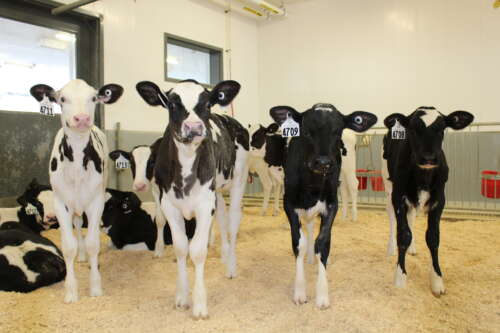Improving human and animal health, ensuring environmental sustainability and further strengthening Canada’s dairy industry are the goals of a newly funded, $6.1-million project headed by a University of Guelph food scientist.
Dr. Gisèle LaPointe, a professor in U of G’s Ontario Agricultural College (OAC), will lead a five-year initiative in dairy microbiology involving nearly 50 U of G researchers and students as well as five leading partners in Canada’s $20-billion dairy industry.
The Dairy Alliance will receive $3.5 million from the Natural Sciences and Engineering Research Council (NSERC) and a total of $2.6 million in funding and in-kind support from Dairy Farmers of Ontario (DFO), Dairy Farmers of Canada (DFC), Novalait Inc., Lactalis Canada and Lallemand Inc.

The alliance is intended to bring together experts from the University’s OAC and Ontario Veterinary College (OVC) to ensure dairy product quality through improved control of microbial ecosystems from production to processing, said LaPointe.
“Farm management practices have impacts on the types of microbes that are transmitted to milk, which in turn influence processing and the shelf life of the products,” said LaPointe, who was named the NSERC/DFO Industrial Research Chair in Dairy Microbiology in 2016 and is known internationally for her studies of how microbes interact in food systems, particularly in milk and dairy products.
At U of G, principal researchers in OAC and OVC are LaPointe; Dr. Michael Steele, Department of Animal Biosciences; Dr. Lawrence Goodridge, Department of Food Science; and Dr. Nicole Ricker, Department of Pathobiology. Also involved are Dr. David Kelton, Department of Population Medicine in OVC, and Dr. Carlos Leon-Velarde, supervisor of food microbiology in the Agriculture and Food Laboratory in U of G’s Laboratory Services.
“This support is fantastic news for this dairy collaboration involving University of Guelph researchers and key industry partners,” said Dr. Malcolm Campbell, vice-president (research). “By enhancing health, improving environmental sustainability and supporting Canada’s vital dairy sector, the Dairy Alliance embodies key U of G values and promises to improve dairy products for many Canadians in numerous ways.”
Guelph MP Lloyd Longfield said, “it is great to see NSERC support for the U of G efforts to improve our dairy farmers’ competitiveness in an increasingly aggressive global market, and one in which Canada is participating via our free trade agreements. At the same time, this will benefit Canadian consumers by making our high quality dairy products accessible to more people across our country, while simultaneously opening up export opportunities.”
Helping to monitor and detect bacteria or disease

The project’s findings will feed into Canada’s National Dairy Research Strategy, which aims to support continuous improvement in the sustainable production of quality, nutritious dairy products.
“For the last 30 years, DFO has proudly supported microbiology research at the University of Guelph to find innovative solutions that ensure the Canadian dairy industry upholds world-class milk production practices,” says Cheryl Smith, chief executive officer of DFO.
“DFO’s $1-million investment will bring competitiveness to dairy farmers by helping monitor and detect any bacteria or disease in real-time. This ultimately supports waste reduction and cost savings. The research findings will help bring improved dairy products to market and solidify consumer trust in our food supply chain. Ontario’s 3,400 dairy producers, their families and employees support research like this that puts a focus on sustainability and future growth.”
Improving human, animal and environmental health
The Dairy Alliance will conduct research under all four themes of the strategy, as follows:
- Dairy farm sustainability – developing new feed ingredients and mitigating methane emissions to make milk production more sustainable while increasing cattle feed efficiency
- Animal health and welfare – designing microbial treatments and preventing housing contamination
- Milk composition, quality and safety – understanding impacts of farm management practices on shelf life and processing streams to maintain the regional flavours of Canadian cheeses while reducing dairy product spoilage and waste
- Dairy in human nutrition and health – control of food-borne pathogens and reducing antimicrobial gene persistence in gut microbes of dairy cattle
“Those aspects are intended to improve human and animal health as well as environmental health,” said LaPointe. “Dairy farmers are making efforts to optimize land use, while reducing antimicrobial use, water consumption and the carbon footprint of milk production. The alliance will help strengthen collaborations between the Canadian producer and processor groups.”
The project will enable training of students and researchers as high-quality personnel for the Canadian dairy industry, which accounts for more than 220,000 full-time jobs.
Contact:
Dr. Gisèle LaPointe
glapoint@uoguelph.ca
